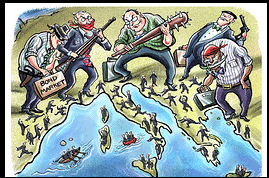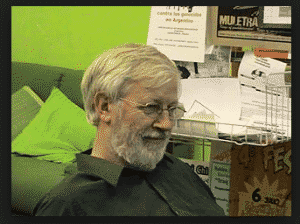
Notes on the Global Condition: The Europeans and the IMF
In picking Kristalina Georgieva, the Bulgarian chief executive of the World Bank, as their candidate to succeed Lagarde at the IMF, the EU made the

In picking Kristalina Georgieva, the Bulgarian chief executive of the World Bank, as their candidate to succeed Lagarde at the IMF, the EU made the

Between 2014 and 2016 the US dollar appreciated by almost 25 percent against a basket of world currencies. The shift was driven above all

What happens when the anthropocene puts a time limit on the lifespan of political sovereignty?

Taking stock of the last few weeks of reading about the biggest story in the world economy.

If inequality and elite class strategy drive the Sino-American imbalance on the Chinese side, it most certainly does on the US side too.

What happens when the history of the weather overtakes the greatest military superpower the world has ever seen? What happens when the sea level rises faster than you replace the infrastructure and machinery of global nuclear power?

The place of history in thinking about the “crisis of democracy”. A call for hot takes on a rushed essay about the recent historiography of democracy.

From Iowa to Brazil’s cerrado by way of the Gulf of Mexico – the dizzying hemispheric agro-industrial and ecological connections.

Trump’s National Security Strategy offers a bleak vision of history and the present.

Migrant European musicians, the Family of Man and David Hockney’s America.

Following up last week’s post on sovereign bond markets. Plus a giant Tajik dam!

Charting the “strategic game” between sovereign borrowers and capital markets since 2008.

What are the implications if the IMF is correct and over the next five years the US is the only large net supplier of sovereign debt to global bond markets?

Recommending a brilliant non-reductive political economy of the Wall Street-City of London nexus and its role in the 2008 crisis.

How Europe’s banks almost ran out of dollars and the Fed saved them. What are the implications for the politics of global financial governance?

The IMF’s evaluation of the Trump administration’s economic policies starts well but pulls it punches.

Can folks find Ukraine and North Korea on a map and is their ability to do so associated with their preference for military intervention? Unfortunately so. What might be a progressive response.

How Europe’s globalized space program intersects with “post”-colonial struggles in French Guiana.

Under the title “Horn of Africa: Pivot of the World” LMD published a great piece by Gérard Prunier last year on the truly mind-blowing

A lunchtime exchange with Andreas Dombret on the Eurozone, trans-Atlantic relations and populism.

No Easter chocolate cheer on the Ivory Coast where the 2016-2017 cocoa price collapse is threatening to wreak havoc and derail a reform agenda.

Untangling how falling trade costs have and have not driven global integration.

Summers, Bernstein, Wolf and Setser dig into the new balance of financial terror between China and the US.

China’s FDI surge challenges both Germany and US to define national economic interests beyond the platitudes of “market economics”. In the German case this raises the issue of Europe and trans-Atlantic relations.

How the Czech republic and Chihuahua state are linked in the strategies of transnational suppliers. Comparing NAFTA and EU expansion as geoeconomic strategies in the post Cold War period.

Recent work by Sean Starrs and how it helps us to understand US-centric hierarchies of ownership and control in global capitalism.

Uncertainty rules. Can the protectionist turn be for real? Does anyone know? The FT, the Washington Post, the White House anyone?

The extraordinary conjuncture of Egyptian surrealism, anti-fascism, Trotsky, Breton & World War II.

After flogging and Brexit, today we crash-test an 8*8 matrix. Yes … really. Social theory in the spirit of Roadkill.

Do the stresses of globalization, the “left behind white working-class” or racism and authoritarianism explain the surge in support for right-wing populism? Can we escape an intellectual impasse? Back to Gramsci and Sartre?

How the “informal economy” was discovered in the 1970s and where we are now in our efforts to count how and where most people in the poorest countries work.

Staggering data from the ILO on India’s labour market. Only 7 % of Indian workers work on formal contracts in formal enterprises! Data that put one in mind of classic debates within German Social Democracy on how to characterize capitalist social structures.

As Sisi’s regime embarks on a tough IMF program it faces huge domestic economic pressures and a new conflict with Saudi Arabia over Syria that has shut off its vital oil supply.

Why a pluralist account of globalization is necessary to map the crisis of 2008.

Global dollars, Nikes, oil, cotton, HIV-drugs, MBS, the AK47, the container, the internet and Hollywood … distinguishing 10 distinct regimes of globalization. Trying to build resistance to reduction.

An as yet rather abstract proposal to experiment with thinking the uneven and combined development of global capitalism in terms of sectors.